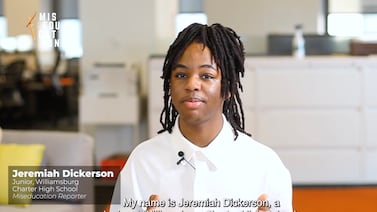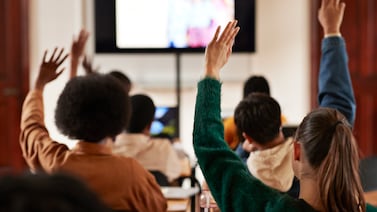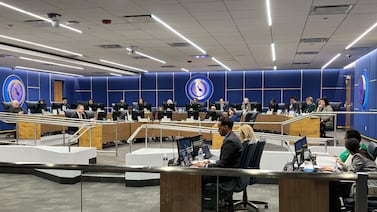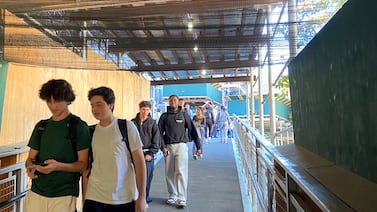The Illinois State Board of Education plans to divide $569 million in federal emergency funds to help school districts bridge the digital divide and train educators, but it remains unclear how much will go to private schools.
In their first meeting since March, the board on Wednesday focused on how to allocate federal CARES Act monies intended to help fill funding holes created by the battle against the coronavirus. Federal guidelines require the State Board of Education to give 90% to school districts, totaling about $512 million. The state may spend 9.5% of the funds, a little over $54 million, and less than 1% of the funds may be used for administrative costs, about $2.8 million.
From a separate federal grant designated for governors to use at their discretion, Illinois Gov. J.B. Pritzker will receive $108 million for education. He said in April he planned to spend it on expanding resources for remote learning, teacher support, and meal distribution. Asked for more particulars, his office did not respond by deadline.
Here’s how the Illinois State Board of Education spending breaks down so far:
$512 million is going to school districts across the state.
Districts can spend the money on technology, professional development, support for low-income families, meal distribution, and summer and extended learning opportunities.
The state will allocate funds based on how many low-income students a district serves. A survey by Chalkbeat and the Better Government Bureau revealed that since campuses closed, five of the largest school districts in the state — which are set to receive a large portion of the funding — have devoted most of their spending so far to tech devices for home learning.
Nearly $33 million will go to additional device purchases.
The state board will make a little over $54 million available to school districts via a competitive grant application.
Most of that money is intended to provide schools with technology and internet access; $32.9 million will go to additional device purchases and $7.1 million will go to improve internet connectivity.
Almost $12 million will go to coaching educators.
The board will invest $6.5 million into virtual coaching for newly licensed teachers to help them navigate remote learning. It will set aside $6.4 million for training teachers and for parents who are struggling to educate their students at home.
State Superintendent Carmen Ayala said that the board is still designing professional development and parent support and deciding who will provide those services.
$1 million will go to the state’s wealthier districts.
The board will give $1 million to 186 agencies, including 15 school districts that don’t serve areas with concentrations of poverty.
It’s unclear how much will go to private schools.
One of the more controversial aspects of CARES Act funding is set-aside for private schools. The federal act suggested sharing funds with private schools based on their proportion of low-income students, but U.S. Secretary of Education Betsy DeVos later instructed districts to base private schools allocations on their total enrollment — thus a much larger sum, which will come at the expense of public schools.
The state board has directed school districts to set aside an amount based on total private school enrollment, but to initially hand out a smaller amount based on enrollment of low-income students. Depending on additional guidance expected from the U.S. Department of Education, the difference of the two totals would go to either private or public schools.
As of Thursday afternoon, a spokeswoman for the state board had not shared estimates. The Archdiocese of Chicago, which runs more than 200 schools in Cook and Lake counties that enroll 71,000 students, told Chalkbeat this week it is still unclear how much it will receive.
Amy Meek with the Chicago Lawyers Committee for Civil Rights read a joint statement during the public comment section of the board meeting Wednesday asking members to award federal funding in an equitable way to help prevent education gaps for vulnerable students.
The statement, also delivered on behalf of Illinois Raise Your Hand, Brighton Park Neighborhood Community Council, and Chicago United For Equity, urged the State Board of Education to reject Devos’ recent guidance. “(The recent guidance) misreads the CARES Act in telling states to identify federal funds for all private schools no matter how high their household income. Instead, we ask ISBE to direct districts to set aside funds for private schools based on students’ poverty rate consistent with legal precedents.”






